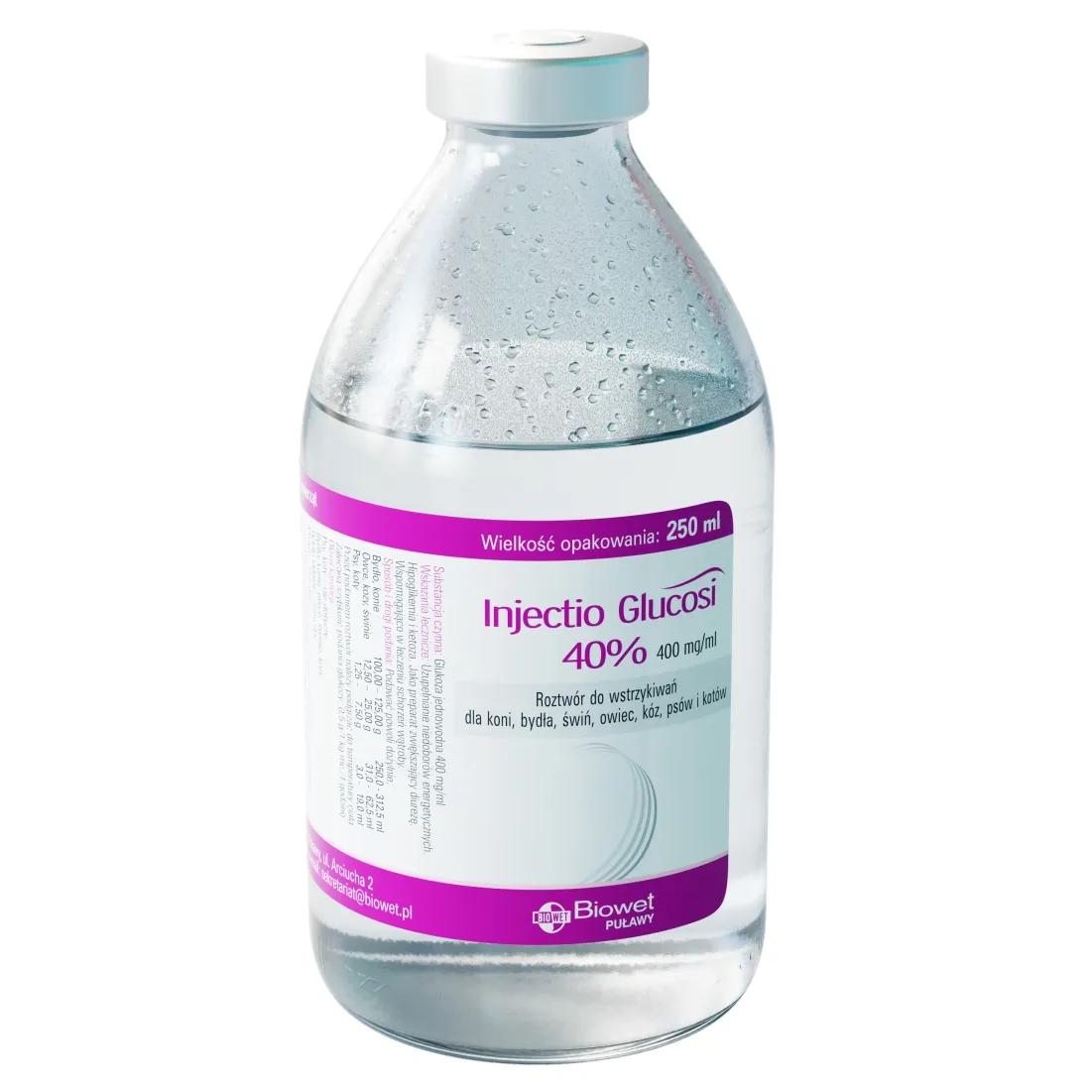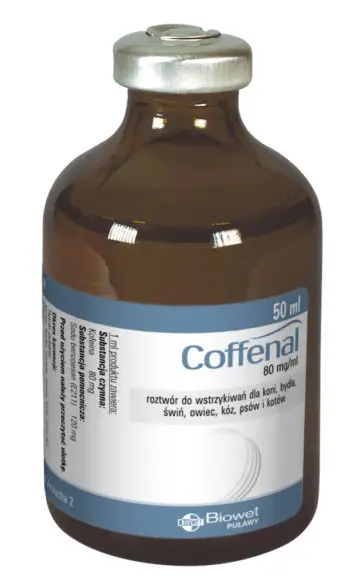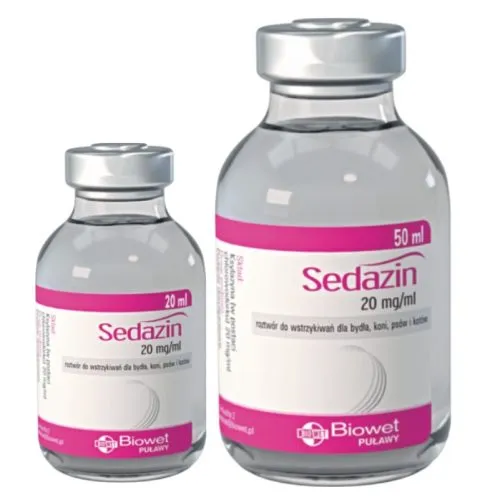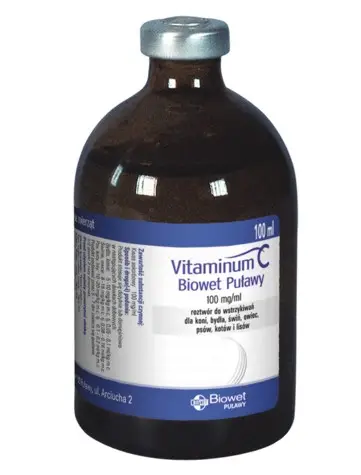Description
Solution for injections for horses, cattle, swine, sheep, goats, dogs and cats
Active substance and excipient content
Glucosum monohydricum 400 mg/ml
Therapeutic indications
Supplementation of energy deficiency.
Hypoglycaemia and ketosis treatment.
As a diuretic preparation.
Supportive in liver diseases treatment.
Contraindications
Hyperglycaemia
Water intoxication
Hypotonic dehydration and acidosis.
Adverse reactions
Rapid or prolonged administration of glucose solution might increase diuresis and cause tissue dehydration and water electrolyte disorders, including hypoglycaemia.
Administration of glucose as the only fluid might lead to development of hypervolemia, hypoosmia and electrolyte imbalance. Parenteral administration of glucose solutions requires administration of potassium, magnesium and phosphates.
Too rapid administration of glucose might cause pulmonary oedema.
The product displays an irritating effect and may cause pain at the injection site. Administered into peripheral vessels, it causes local thrombotic and inflammatory lesions.
Administration of the product with a temperature lower than body temperature might cause irritation and thrombophlebitis at the injection site.
Any adverse reactions emerged after administration of the product or any observed symptoms not listed in the leaflet (including symptoms reported in humans following exposure to the product) should be reported to the competent veterinarian, Marketing Authorization Holder or the Office for Registration of Medicinal Products, Medical Devices and Biocidal Products. The report form should be downloaded from https://www.urpl.gov.pl (Department of Veterinary Medicinal Products).
Posology per each species, routes and methods of administration
Administer the product slowly intramuscularly in the following doses:
| Animal species | Glucose in substance | INJECTIO GLUCOSI 40 % |
| Cattle, horses | 100.00 – 125.00g | 250.0 – 312.5ml |
| Sheep, goats, swine | 12.50 – 25.00g | 31.0 -62.5 ml |
| Dogs, cats | 1.25 – 7.50g | 3.0 – 19.0ml |
Recommendations for proper administration
The solution should be warmed to body temperature before intravenous use.
Recommended glucose administration rate: 0.5 g/1 kg b.w./1 hour.
Once the container is opened, the product cannot be stored and used again. If visually detectable changes in the solution or damage to the package occur, the product should not be used.
Withdrawal period
Dogs, cats – not applicable
Cattle, horses, sheep, swine, goats
Edible tissues – zero days
Milk – zero days.
Special precautions for storage
Keep out of the sight and reach of children.
Do not use after the expiry date given on the label.
Store at a temperature below 25°C. Protect from sunlight. Do not freeze
Durability after the first opening of the immediate package – use the content of the package all at once.
Special warnings
Special precautions for use in animals
During administration of glucose solution, proper infusion rate should be maintained. Too rapid or prolonged administration might cause tissue dehydration and water electrolyte disorders.
In diabetic patients, administer glucose only in the case of life-threatening hypoglycaemia induced by insulin overdose.
Use with caution in animals with adrenal insufficiency and in anuria.
During a long-lasting use, fluid balance, concentration of electrolytes and acid-base balance should be monitored.
Special precautions for persons administering the medicinal veterinary product to animals:
Caution should be taken to avoid self-injection.
Glucose might cause serious physiological changes which are dangerous to a pregnant female and foetus. Therefore, the product should not be used in pregnancy except in absolute necessity and with particular caution.
No contraindications for use in lactation.
Glucose overdose causes hyperglycaemia and osmotic diuresis, which in consequence leads to cellular dehydration.
In the case of overdose, apply symptomatic treatment.
In physiological conditions, glucose present at excessive concentrations in the circulatory system after reaching the renal threshold is excreted through the kidneys. A healthy body is capable of maintaining glucose homeostasis and, as a result of polydipsia and polyuria, maintain the correct glucose level.
Glucose should not be combined in solutions with barbiturates, sulphonamides, erythromycin, hydrocortisone and vitamin B12.
Special precautions for the disposal of unused veterinary medicinal product or waste materials derived from the use of such products
Medicines should not be disposed of via wastewater or household waste.
Ask your veterinary surgeon how to dispose of medicines no longer required. These measures should help to protect the environment.
Other information
For more information about this veterinary medicinal product, contact the Marketing Authorization Holder.
Available containers
250 ml
Shelf life
2 years
For animal treatment only.
Subject to medical prescription – prescription drug.
Tobe administered under veterinary supervision.
2015-05-07 SPC
31.08.2017 r.






